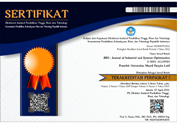ANALISIS PERCEPATAN WAKTU PADA PEKERJAAN SIPIL PROYEK PEMBANGUNAN LPG REFRIGERATED DENGAN MENGGUNAKAN METODE CRITICAL PATH METHOD (CPM) DAN TIME COST TRADE OFF (TCTO)
DOI:
https://doi.org/10.51804/jiso.v6i1.9-16Keywords:
acceleration, critical path method, delay, development, time cost trade ofAbstract
Pembangunan LPG Refrigerated yang terletak di tuban, Jawa Timur saat ini sedang dalam proses pembangunan. Pengerjaan proyek direncanakan dalam waktu 399 hari dengan nilai total proyek sebesar Rp. 14.584.800.000. Selama pelaksanaan proyek sering mengalami keterlambatan aktivitas pekerjaan yang menyebabkan durasi waktu penyelesaiannya mengalami kemunduran dari jadwal yang telah ditentukan. Akibatnya terjadi penundaan waktu untuk memulai aktivitas pekerjaan berikutnya. Hal tersebut tidak hanya menambah durasi umur proyek, akan tetapi juga mengakibatkan pembengkakan anggaran biaya. Banyak faktor yang menyebabkan keterlambatan penyelesaian terhadap suatu pekerjaan meliputi penyediaan bahan baku, keadaan alam, letak geografis dan berbagai unsur lainnya. Dengan demikian perlu diadakan analisa untuk mempercepat durasi proyek, dimana pada penelitian ini akan menggunakan metode Critical Path Method (CPM) dan Time Cost Trade Off (TCTO) untuk melakukan percepatan durasi waktu pada aktivitas yang berada dijalur kritis. Hasil Perhitungan dengan metode Time Cost Trade Off didapatkan durasi dan biaya optimal proyek pembangunan LPG Refrigerated yaitu selama 364 hari dengan penambahan 1 jam lembur yang dapat mempercepat proyek hingga 35 hari dari durasi normal yaitu selama 399 hari dengan total tambahan biaya sebesar Rp. 235.580.228.
ABSTRACT
The development of a Refrigerated LPG located in Tuban, East Java is currently under construction. Project work is planned within 399 days with a total project value of Rp. 14,584,800,000. During project implementation, work activities often experience delays which cause the duration of the completion time to experience a setback from the predetermined schedule. As a result, there is a time delay to start the next work activity. This not only increases the duration of the life of the project, but also results in an increase in the budget. Many factors cause delays in the completion of a work including the supply of raw materials, natural conditions, geographical location and various other elements. Thus it is necessary to carry out an analysis to accelerate the duration of the project, which in this study will use the Critical Path Method (CPM) and Time Cost Trade Off (TCTO) methods to accelerate the duration of time for activities that are on a critical path. Calculation results using the Time Cost Trade Off method obtained the optimal duration and cost of the Refrigerated LPG development project, namely for 364 days with the addition of 1 hour of overtime which can accelerate the project by up to 35 days from the normal duration, which is 399 days with a total additional cost of Rp. 235,580,228.
References
Basuki, K. (2019) ‘Proyek’, ISSN 2502-3632 (Online) ISSN 2356-0304 (Paper) Jurnal Online Internasional & Nasional Vol. 7 No.1, Januari – Juni 2019 Universitas 17 Agustus 1945 Jakarta, 53(9), pp. 1689–1699.
Izzah, N. (2017) ‘Analisis Pertukaran Waktu dan Biaya Menggunakan Metode Time Cost Trade Off (TCTO) pada Proyek Pembangunan Perumahan di PT. X’, 10, pp. 51–58.
Khorsani, V. (2018) ‘Studi Perencanaan Percepatan Durasi Proyek Dengan Metode Least Cost Analysis’.
Lamgok Tardok, E. (2018) ANALISIS PERCEPATAN WAKTU MENGGUNAKAN METODE CPM DAN PERT PADA PROYEK PEMBANGUNAN DERMAGA PELABUHAN TANJUNG PRIOK.
Downloads
Published
Issue
Section
License
With the receipt of the article by JISO Editorial Board and the decision to be published, the copyright regarding the article will be transferred to JISO. The copyright transfer form can be downloaded here.
JISO has the right to multiply and distribute the article and every author is not allowed to publish the same article that was published in this journal.
JISO is licensed under a Creative Commons Attribution-ShareAlike 4.0 International License.
Under the following terms:
Attribution — You must give appropriate credit, provide a link to the license, and indicate if changes were made. You may do so in any reasonable manner, but not in any way that suggests the licensor endorses you or your use.
ShareAlike — If you remix, transform, or build upon the material, you must distribute your contributions under the same license as the original.














